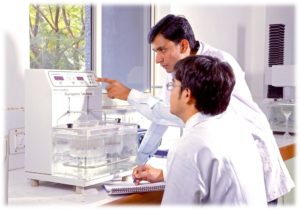 Programme Educational Objectives (PEOs)
Programme Educational Objectives (PEOs)
- To acquire effective knowledge of pharmaceutical sciences leading to hold key position in the industry and health care sector.
- To attain practical training and technical expertise in pharmaceutical sciences.
- To inculcate professional and ethical standards with effective interpersonal communication skills.
- To develop an interdisciplinary Pharmaceutical approach towards the societal benefit, problem-solving and lifelong learning.
- To adopt and implement best practices in the profession by enrichment of knowledge and skills in research and critical thinking.
Programme Outcomes(POs)
- Pharmacy Knowledge: Possess knowledge and comprehension of the core and basic knowledge associated with the profession of pharmacy, including biomedical sciences; pharmaceutical sciences; behavioral, social, and administrative pharmacy sciences; and manufacturing practices.
- Planning Abilities: Demonstrate effective planning abilities including time management, resource management, delegation skills, and organisational skills. Develop and implement plans and organize work to meet deadlines
- Problem analysis: Utilise the principles of scientific inquiry, thinking analytically, clearly and critically, while solving problems and making decisions during daily practice. Find, analsze, evaluate and apply information systematically and shall make defensible decisions.
- Modern tool usage: Learn, select, and apply appropriate methods and procedures, resources, and modern pharmacy-related computing tools with an understanding of the limitations
- Leadership skills: Understand and consider the human reaction to change, motivation issues, leadership, and team-building when planning changes required for fulfillment of practice, professional and societal responsibilities. Assume participatory roles as responsible citizens or leadership roles when appropriate to facilitate improvement in health and well-being.
- Professional Identity: Understand, analyse and communicate the value of their professional roles in society (e.g. health care professionals, promoters of health, educators, managers, employers, employees).
- Pharmaceutical Ethics: Honor personal values and apply ethical principles in professional and social contexts. Demonstrate behavior that recognises cultural and personal variability in values, communication, and lifestyles. Use ethical frameworks; apply ethical principles while making decisions and take responsibility for the outcomes associated with the decisions.
- Communication: Communicate effectively with the pharmacy community and with society at large, such as being able to comprehend and write effective reports, make effective presentations and documentation, and give and receive clear instructions.
- The Pharmacist and society: Apply to reason informed by the contextual knowledge to assess societal, health, safety and legal issues and the consequent responsibilities relevant to the professional pharmacy practice.
- Environment and sustainability: Understand the impact of the professional pharmacy solutions in societal and environmental contexts, and demonstrate the knowledge of, and need for sustainable development.
- Life-long learning: Recognise the need for, and have the preparation and ability to engage in independent and life-long learning in the broadest context of technological change. Self-assess and use feedback effectively from others to identify learning needs and to satisfy these needs on an ongoing basis.
Institute of Pharmacy follows a continuous evaluation as per the guidelines of PCI for the academic year 2018-19. Accordingly, all the courses are evaluated by internal and external assessment. Also, the drawing of questions papers (Sessional and SEE examination) is done as per the PCI guidelines. The assessment components include continuous mode and sessional examination as a part of internal evaluation and semester end examination (SEE) for theory courses. The internal evaluation is done throughout the semester via continuous mode while the sessional examination is being conducted in the mid of the semester. The students are evaluated at the end of the semester through semester end examination. The drawing and assessment of SEE question paper are done in two separate sections, each by two different examiners; one internal and preferably one external. For the practical courses also, evaluation is divided into internal assessment and Laboratory Practical Examination. The continous evaluation includes various components like practical skill, day-to-day performance in the laboratory, clarity of basic concepts related to practical, Journal writing, LPW review and attendance. The various components of sessional as well as SEE examination can be a synopsis, major and minor experiments, viva-voce, etc.
Academic Calendar 2025-26

 Programme Educational Objectives (PEOs)
Programme Educational Objectives (PEOs)